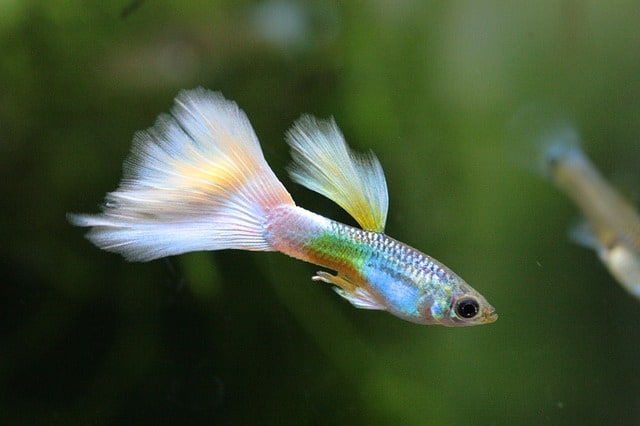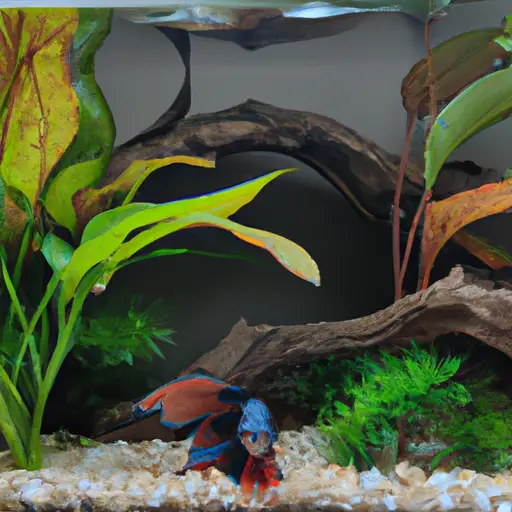Housing guppies and bettas together can be a rewarding experience for fish enthusiasts. Still, it’s essential to understand these two species’ unique characteristics and needs to create a prosperous and harmonious environment. This article will provide expert tips for successfully housing guppies and bettas together, including information on compatibility, habitat requirements, and potential challenges to be aware of. Following these tips ensures that your guppies and bettas live happy and healthy lives together.
Guppies and bettas can live together, but the tank needs to be large enough and have hiding places. Monitor behavior and intervene if necessary to prevent aggression. Proper care is key to success.
There are certain factors to consider to create a prosperous and harmonious environment for both species. First, it’s essential to ensure that the tank is large enough to accommodate both types of fish, with plenty of hiding places and plants for the betta to retreat to if necessary. Additionally, it’s crucial to monitor the behavior of the fish and intervene if necessary to prevent aggression or territorial behavior. Proper care and attention can help guppies and bettas coexist peacefully in the same tank.
Proper care is essential for the health and wellbeing of guppy and betta fish. This includes providing a suitable habitat with the appropriate temperature, filtration, and plants. It also involves providing a balanced and varied diet and regular maintenance and cleanings to keep the tank clean and healthy. Additionally, it’s important to identify signs of illness or injury and take appropriate action to help sick or injured fish. By prioritizing proper care, you can help ensure that your guppies and bettas live happy and healthy lives.

Understanding the Basic Needs of Guppies and Bettas
The necessary elements for a healthy guppy and betta habitat include the following:
- Water temperature: Guppies and bettas thrive in warm water, with a temperature between 78-82 degrees Fahrenheit ideal for both species. Using a reliable aquarium heater to maintain a consistent water temperature is very important.
- Filtration: Proper filtration is essential for removing waste and toxins from the water and maintaining good water quality. Choosing a filter appropriate for the tank size and the number of fish is important.
- Plants: Both guppies and bettas enjoy having plants in their environment, and they can provide hiding places and shelter for the fish. Live plants help maintain good water quality and provide additional oxygen.
In addition to these elements, it’s also important to provide plenty of hiding places and hiding spots for the betta, as they are a territorial species and may become aggressive towards other fish. A well-planted tank with plenty of hiding spots can help create a peaceful and harmonious environment for both guppies and bettas.
Providing Proper Nutrition
Both guppies and bettas are omnivorous, which means that they require a varied diet that includes both plant and animal-based foods. Guppies and bettas feed on insects, worms, small prey, algae, and other plant matter in the wild. You can feed them different commercial fish foods in captivity, including pellets, flakes, and freeze-dried options. It’s important to provide a balanced and varied diet and to avoid overfeeding, as this can lead to health problems such as obesity and increased waste production.
In addition to providing a balanced diet, it’s also important to vary the types of foods offered to guppies and bettas. This can help prevent boredom and ensure the fish receive all the nutrients they need. Offer a mix of different commercial fish foods and live or frozen foods such as bloodworms or brine shrimp. This can help provide the essential proteins, fats, and vitamins that guppies and bettas require for optimal health.

Ensuring Regular Maintenance
Regular tank cleanings and water changes are essential for the health and wellbeing of guppies and bettas. Fish produce waste, which can quickly build up in the tank and cause water quality to decline. This can lead to various health problems, such as bacterial infections and ammonia poisoning. In addition, uneaten food and decaying plant matter can also contribute to poor water quality and create an unhealthy environment for the fish.
If you want to prevent these issues, it’s essential to perform regular tank cleanings and water changes. This involves removing waste, uneaten food, and other debris from the tank and replacing some water with fresh, treated water. The frequency of these cleanings and water changes will depend on the size of the tank and the number of fish, but as a general rule, we recommend performing a partial water change (25-50%) every week and a full tank cleaning every 2-4 weeks. This can help maintain good water quality and keep your guppies and bettas healthy and happy.
Caring for Sick or Injured Fish
It’s important to identify signs of illness or injury in guppies and bettas to take appropriate action to help sick or injured fish. Some common symptoms of illness or injury include:
- Behavior change: Sick or injured fish may become lethargic, inactive, or display unusual behavior, such as darting around the tank or hiding.
- Change in appearance: Sick or injured fish may develop visible symptoms such as redness, swelling, or wounds. They may also lose their color or develop patches of white or cloudy areas on their body or fins.
- Change in appetite: Sick or injured fish may lose their appetite or refuse to eat.
Taking appropriate action is essential if you notice these signs in your guppies or bettas. This may involve isolating the affected fish in a separate tank, providing supportive care such as medication or increased aeration, and consulting a veterinarian if necessary. By monitoring the health of your fish and taking action as needed, you can help ensure that your guppies and bettas stay happy and healthy.
Conclusion
In summary, it’s important to prioritize the proper care of guppy and betta fish to keep them happy and healthy. This involves providing a suitable habitat with the appropriate temperature, filtration, and plants. It also provides a balanced and varied diet and regular maintenance and cleanings to keep the tank clean and healthy.
Additionally, it’s important to identify signs of illness or injury and take appropriate action to help sick or injured fish. By following these tips and prioritizing the proper care of your guppies and bettas, you can help ensure they live happy and healthy lives together.
